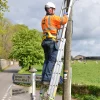UK Government Preps New Rural Business Broadband Voucher Scheme
Several Government MPs have hinted that the forthcoming 2017 Budget announcement on the 8th March will see a rural-focused reincarnation of the Connection Voucher scheme, which gifted grants of up to £3,000 to help smaller UK businesses get a superfast broadband (30Mbps+) service installed.
The original scheme, which helped roughly 55,000 SMEs (small and medium sized businesses) around 50 cities across the United Kingdom, came to an end in 2015 after funding dried-up (here). Since then a number of local authorities have launched their own voucher programmes (e.g. here and here) and the central Government has been consulting upon the idea of a new scheme since December 2016 (here).
Prior to Christmas the talk was all about the new scheme being used to help support alternative network (AltNet) ISPs by offering extra funding to help them connect rural homes. However the latest report from The Telegraph appears to indicate that the focus has shifted back to rural businesses, although it’s entirely possible that the Government might do new vouchers for both homes and businesses.
Advertisement
MP Ian Liddell-Grainger, Chair of the a Parliamentary Broadband Group, said:
“Every party in the UK has been saying this needs to be rolled out as fast as possible. It is hugely important and absolutely vital. The percentage of people who now work at home in rural areas is going up massively. Small businesses nowadays have to have high-speed broadband. You can’t run a business without it.”
Apparently a final decision on the reincarnated voucher scheme is expected to take place within the next few days, although some MPs appear to be suggesting that it’s already a done deal. The Government are also considering how they might be better able to bring faster connectivity to public buildings in rural areas, which could then share that capacity out with local ISPs.
However we’d hope that the new scheme would be more flexible, allowing vouchers to be easily aggregated by multiple businesses and ideally offering extra funding because it generally costs more to reach rural businesses than those in urban areas. Most urban businesses benefit from being closer to major infrastructure, which tends to be absent in rural areas.
Mark is a professional technology writer, IT consultant and computer engineer from Dorset (England), he also founded ISPreview in 1999 and enjoys analysing the latest telecoms and broadband developments. Find me on X (Twitter), Mastodon, Facebook, BlueSky, Threads.net and Linkedin.
« BT Join the Telecom Infra Project and Facebook to Build Future Telecoms Tech


















































Comments are closed